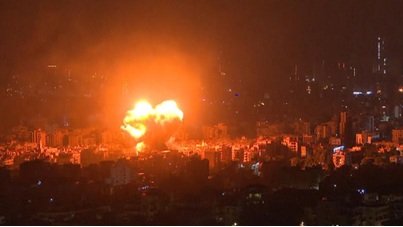By Abdikarim Haji Abdi Buh
TEHRAN, once again, explosions rocked Iran last night as Israel allegedly struck key nuclear facilities deep within the Islamic Republic. The latest assault is far more than another chapter in the long-standing shadow war between Israel and Iran; it is yet another humiliating reminder of the astonishing reach of Israel’s feared intelligence agency — Mossad — inside one of the world’s most security-obsessed states.
The question that resonates after every such attack: how can Mossad penetrate Iran’s iron-clad defenses with such surgical precision, killing nuclear scientists, high-ranking military officers, and even Hamas leaders, all while striking deeply protected nuclear sites under the noses of Iran’s intelligence services?
Mossad’s Long Arm in Tehran
For decades, Iran has projected itself as an impenetrable fortress against its sworn enemy, Israel. Yet, Mossad has systematically dismantled that illusion. The 2020 assassination of top nuclear scientist Mohsen Fakhrizadeh, the brazen theft of Iran’s entire nuclear archive in 2018, and the recent assassination of Hamas’ top commander, Ismail Haniyah, in the heart of Tehran are only the most visible examples.
“These are not long-distance drone strikes — these are highly coordinated, on-the-ground operations requiring years of infiltration and deep-rooted networks within Iran’s most guarded circles,” said a senior Western intelligence official speaking on condition of anonymity.
Indeed, last night’s strikes on Iran’s nuclear infrastructure would not have been possible without real-time intelligence, insider access, and carefully embedded Mossad operatives positioned throughout Iran’s military, nuclear, and political institutions.
An Inside Job: Iran’s Security Breached from Within
Iranian officials routinely downplay these penetrations, but analysts and even dissidents inside the country paint a different picture.
“Someone is feeding Mossad highly sensitive information from inside the establishment,” said an exiled Iranian journalist based in Europe. “The regime has a serious loyalty problem even within its own security apparatus.”
Following each successful Israeli operation, the regime has responded with mass arrests, accusations of treason, and purges within its own intelligence services. But these repressive measures have failed to stem the deepening penetration — and may even have driven more disillusioned insiders into the arms of Israel’s spy networks.
Sanctions Erode Loyalty
Iran’s security failures cannot be understood without recognizing the corrosive impact of its failing economy. For decades, U.S. and international sanctions have crippled Iran’s economy, shrinking GDP, inflating prices, and fueling mass unemployment. The national currency, the rial, has collapsed in value while public services continue to decay.
“You cannot run a loyal security state when even your intelligence officers are struggling to feed their families,” remarked a former intelligence officer familiar with Iranian affairs. “Israel has been extraordinarily adept at exploiting this financial desperation to recruit assets at every level.”
As Iran’s internal wealth gap grows and corruption becomes rampant, the loyalty of even those within the Revolutionary Guards and the Ministry of Intelligence — once thought unshakeable — has become increasingly fragile.
The Khomeini Doctrine Is Cracking
At the heart of Iran’s crisis lies a dying ideology. The theocratic rule envisioned by Ayatollah Khomeini in 1979 sought to create an Islamic utopia. Instead, it has delivered repression, economic failure, and international isolation.
“Young Iranians no longer buy into the state’s revolutionary rhetoric,” says Dr. Mehrdad Shamsi, an Iranian political analyst based in London. “They want opportunity, not martyrdom. They want jobs, not missiles.”
The brutal crackdown on nationwide protests following the death of 22-year-old Mahsa Amini — who was killed while in the custody of Iran’s notorious morality police for allegedly violating the country’s strict hijab laws — has further eroded the regime’s credibility among its own people. The rallying cry “Women, Life, Freedom,” first chanted at Mahsa’s funeral, quickly ignited widespread demonstrations across the country, exposing deep-seated public anger against the totalitarian system. Even within the regime’s power structure, cracks are beginning to show: the once-feared Basij militias and segments of the Islamic Revolutionary Guard Corps (IRGC) are reportedly experiencing falling morale and wavering loyalty.
Why Tehran Doesn’t Retaliate
Iran’s response to repeated Israeli incursions has been largely muted. Instead of directly confronting Israel, the regime continues to lean on its proxy network — Hezbollah, the Houthis, and various militias across Iraq, Syria, and Yemen — to maintain its regional posture. But even these proxies have suffered significant Israeli counterstrikes in recent years.
“They simply cannot afford a full-scale war with Israel,” said a Middle East security analyst. “Every time Mossad strikes inside Iran, the leadership finds itself paralyzed — fearing any serious escalation could spark a war they know they would likely lose.”
The Nuclear Red Herring
While Iranian state media often frame these Israeli strikes as attempts to derail imminent oil or nuclear breakthroughs, reality suggests otherwise. Many of Iran’s energy exploration projects, including petroleum extraction, remain years — if not decades — away from producing viable export volumes. Meanwhile, global demand for fossil fuels continues to shrink under the weight of the green energy transition.
“There will likely be little market for Iranian oil by the time any major extraction begins,” said Dr. Shamsi. “The notion that Israel is striking to stop Iran’s imminent oil wealth is a political diversion — the real war is over Tehran’s shrinking security credibility.”
The Collapse of the Security State
As Israeli operations continue to expose Iran’s vulnerabilities, the regime faces an increasingly dangerous dilemma: escalate and risk catastrophic war, or absorb these humiliations and slowly crumble under the weight of its internal contradictions.
“The Islamic Republic is dying from within,” Dr. Shamsi concluded. “Mossad isn’t destabilizing Iran. Iran’s leaders are destabilizing themselves. Mossad is simply shining a light on the cracks.”
As Tehran reels from its latest security humiliation, one truth is becoming painfully clear to both its enemies and its own people: the once-feared Islamic Republic is no longer the fortress it pretends to be.
Abdikarim Haji Abdi Buh
Email: abdikarimbuh@yahoo.com


Leave a Reply